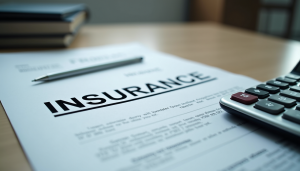You are not alone if you have ever wondered, “What the heck am I paying for?” as you opened your renewal letter.
The cost of auto insurance is actually more individualized than most people realize. It is about you, not simply your vehicle. Even though it may seem unfair, that is how insurance calculates risk.
Let us examine the actual causes of your insurance rate being greater than your friend’s, even if you both drive identical Civics.
1.You Have Different Driving Experiences

Your premium may increase for years after a single speeding citation or minor collision. Your driving history serves as a window into your potential level of danger when driving, according to insurance firms.
Traffic infractions
Mishaps (even if you were not at fault)
History of claims
The price discrepancy may be explained by the fact that your friend has a spotless record and you had a less than glamorous encounter with a parking post the previous year.
2.Credit Score = Risk Score (in Most States)

This is something that most people hate to hear, but it is true: your credit score influences your auto insurance rate in the majority of states.
Data from insurance firms indicates a link between greater claim rates and poor credit. Yes, it is contentious, but in most locations, it is legal.
Therefore, even if you have never made a claim in your life, it could cost you more if your friend has a credit score in the 800s and yours is in the mid-600s.
3.Your Living Situation Is More Important Than You May Believe

Even down to certain communities, your zip code has a significant impact on your premium.
Why? Insurers consider:
Accident rates in the area
Statistics on theft and vandalism
conditions of the roads
Density of population
volume of claims in your region
Therefore, a few blocks could make all the difference, even if you and your friend live in the same city. Higher risk is typically associated with urban zip codes, and higher risk translates into higher rates.
4.You Have Different Options for Coverage

Suppose you both received quotes for the same vehicle. However, your friend decided:
An increased deductible
Reduced coverage limitations
No extras like rental reimbursement or roadside assistance
You choose greater protection in the meantime (because you are that cautious). The disparity might be explained by that alone.
Greater coverage equals greater peace of mind, which raises the price.
5.Driving Patterns and Annual Mileage

Is your commute lengthy? Work-related driving? Travel by car a lot?
Insurance companies take your annual mileage into account. Traveling longer distances exposes one to greater risk. Your insurance provider will take notice if you drive 15,000 miles a year and your pal drives 5,000.
6.Your Marital Status, Gender, and Age (Yes, Really)
Despite their seeming insignificance, these are statistically significant. Insurance companies price risk based on demography.
Younger drivers—particularly those under 25—pay more.
Drivers without spouses may earn more than those with spouses.
In their early driving years, men often earn more, but this might change as they get older.
It is actuarial math, not personal. However, it can be annoying when a friend in their 30s earns less money simply because they got married while you didn’t.
7.Discounts and Loyalty in Insurance

It is possible that your friend is stacking discounts without even recognizing it:
Discount for several policies (auto and home)
programs for safe drivers
Discounts for low mileage
Combining several cars into one
Good student savings
Benefits for employers or alumni groups
You may be losing out on discounts if you do not inquire about these while you are getting a quote.
Concluding Remarks: Compare Everything, Not Just Cars
Because your cars match, it is simple to infer that your insurance should equal your friend’s. In reality, though, you are purchasing a risk profile, and yours is distinct from everyone else’s.
Spend some time doing the following before you accept your elevated rate as the new normal:
Compare quotes from several insurance companies.
Inquire about any discounts.
Examine your deductibles and coverage limitations.
If at all possible, raise your credit score.
Attend a defensive driving course; some insurance companies may reimburse you for it!Because you should not have to wonder how much you will pay. Furthermore, it should not feel like a punishment.




